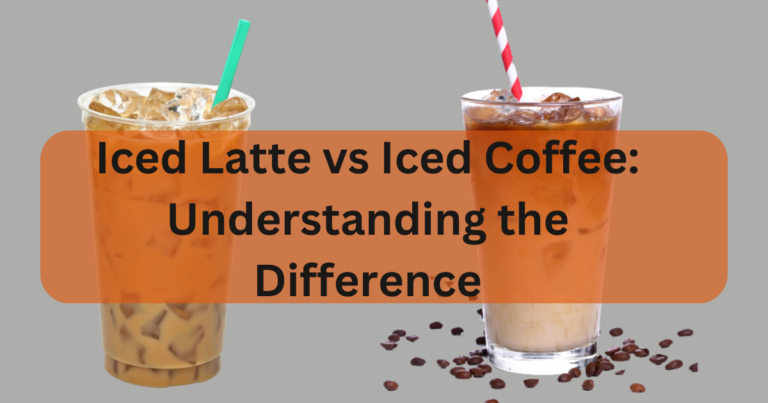Does Coffee Have Carbs? The Ultimate Guide for Coffee Lovers (Black, Latte, and Beyond)

I know how it is important to be aware of the carb content you consume throughout the day. If you are following a keto diet or suffering from diabetes you should keep count of your daily carb intake. Therefore keeping your concern in mind in this article I have discussed, does coffee have carbs? and the approximate amount of carbs in different types of coffee.
All types of coffee have carbs but their amount depends on various factors such as type of coffee, method of preparation, and extras to make it delicious. Black coffee and espresso are virtually carb-free. Lattes, cappuccino and other types of coffee that have sugar and milk have high amounts of carbs. Let’s start and discuss in detail the carb content of all types of coffee.
Contents
- 1 What is the Source of Carbohydrates in Coffee?
- 2 Does Black Coffee Have Carbs?
- 3 How Many Carbs Are in Popular Coffee Beverages?
- 4 How to Reduce Carbs in Coffee Drinks
- 5 How You Can Enjoy Specialty Coffee Drinks
- 6 Carb-friendly coffee recipes
- 7 Coffee and Health Benefits
- 8 Frequently Asked Questions.
- 9 The Bottom Line
What is the Source of Carbohydrates in Coffee?
A coffee bean is a plant seed that contains an embryo and two cotyledons. These cotyledons act as storage for carbohydrates. These carbohydrates provide energy to the germinating seedling until it develops its leaves and starts photosynthesizing.
The amount of these carbohydrates is negligible if we make black coffee or espresso. But when we make other coffee drinks like lattes and cappuccinos the amount of carbs increases significantly due to the addition of sugar and milk. If you are a gym freak, following a healthy diet plan facing diabetes, or following a keto diet you can’t ignore this much amount of carbs.
Does Black Coffee Have Carbs?
Yes, black coffee has carbs, but the amount of these carbs is minimal. A cup of black coffee(355 ml) or one shot of espresso(30 ml) contains less than one gram of carbohydrates in it. Virtually we can say that black coffee and espresso have zero gram carbs which is not zero.
How Many Carbs Are in Popular Coffee Beverages?
Café au lait (1:1 ratio of black coffee to steamed milk): Your coffee drink will contain 6 grams of carbs if it is made with 120ml (4oz) of whole milk. But if you are using almond milk it contains less than 1 gram of carbs.
Cappuccino (1:1:1 ratio of espresso to milk to milk foam): Cappuccino approximately contains 14 grams of carbs.
Latte (1:3 ratio of espresso to milk): The latte usually contains 15 to 24 grams of carbs depending on your customization.
Flat white (1:3:2 ratio of espresso to milk to milk foam): Flat White also contains 15 to 24 grams of carbohydrates.
Mochaccino (a chocolate cappuccino): A 480 ml Starbucks mochaccino contains 44 grams of carbs.
Caramel Brulee Latte: It contains 46 grams of carbs
Americanos:12 fluid ounces of americano contains 0.7 grams of carbs.
Determining the Amount of Carbs in Black Coffee, Cold-Brewed Coffee, and Espresso?
People usually consider black coffee to be carb-free but it has carbs. 355 ml of black coffee has less than 1 gram of carbohydrates.
Cold brew coffee has a higher amount of carbs than black coffee because of its time and process of preparation.
Cold brew coffee beans are infused in cold water for about 12 to 24 hours before preparation. This prolonged cold infusion extracts more carbohydrates from coffee beans. 1 cup of cold brew coffee contains 2 to 4 grams of carbs. One shot of espresso has 0.5 grams of carbs.
How many Grams of Carbs are in Ground Coffee?
The amount of carbs in ground coffee depends on several factors including:
- Bean Type
- Roast Level
- Brewing Method
- Serving Size
Generally, Coffee made from grounds contains approximately 0.5 to 1.7 grams of carbs per cup.
How many Grams of Carbs are in Flavored Coffee?
The International Coffee Organization did research which found that artificially flavored coffee does not contain any extra carbs. because artificial flavor is just a concentrated oil and doesn’t
Have any carbs in it. So the carb content of flavored coffee is similar to its base coffee.
How many Grams of Carbs are in Pumpkin Spice Coffee?
The amount of carbs in pumpkin spice coffee varies for different brands. One bottle of Dunkin’ Donuts pumpkin spice iced coffee contains approximately 41 grams of carbs.
How many carbs are in coffee creamers?
The carb contents of coffee creamer depend on several factors including:
- Type of creamer
- Sugar Contents
- Serving size
One tablespoon of liquid coffee creamer has 2 to 3 grams of carbs.
One teaspoon of powder creamer contains 1 to 2 grams of carbs.
Dairy-based creamer contains a higher amount of carbohydrates than non-dairy alternatives due to the natural sugar present in the lactose. One tablespoon of dairy coffee creamer contains 4 to 5 grams of carbs.
How to Reduce Carbs in Coffee Drinks
Here are some ways to make your coffee low-carb-friendly.
Opt for Unsweetened Black Coffee
One great way to reduce the carb content of your coffee is to use black coffee it contains very low amounts of carbs. You can drink it even if you are following a low-carb diet.
Avoid Sugar At All Costs:
Sugar is the main source of carbs in your coffee. One teaspoon of sugar contains 5 grams of carbs. You can reduce carbs in your coffee drinks if you don’t add sugar.
Make Your Coffee
You can control the amount of carbs in your coffee if you make it by yourself. You can add a lesser amount of those ingredients which are the main source of carbs like milk, syrup, sugar, and milk foam.
Choose Non-Dairy Milk and Coffee Creamer.
There are a lot of non-dairy milk available in the market that you can use. Some are mentioned below
Carbohydrate Content of Different Milk Alternatives (per cup):
- Almond milk: 1 gram
- Coconut milk: 5 grams (unsweetened), 10-15 grams (sweetened)
- Flaxseed milk: 1 gram
- Macadamia nut milk: 2 grams
- Soy milk: 4 grams
- Oat milk: 4 grams
- Cashew milk: 2 grams
Please note:
- These are average values and the actual carb content may vary depending on brands and serving sizes.
Downsize.
Drink less amount of coffee. If you drink a medium size coffee cup you can reduce your carb intake by drinking a small cup or less amount of coffee.
Skip Carb-Rich Extras.
We add a lot of carb-rich extra to make our drink tasty and for its presentation. You can reduce your carb intake by skipping these rich carb extras
How You Can Enjoy Specialty Coffee Drinks
As I have discussed earlier the carb content of different specialty coffee drinks. Now I will discuss how you can enjoy them.
Black Coffee Drinks
Hot americano, Iced americano, and unsweetened iced coffee contain negligible amounts of carbohydrates so you can freely enjoy them. There is another type of coffee known as bullet coffee that is perfect for those people who are keto diet lovers. You can make bullet coffee by adding grass-fed butter, grass-fed ghee, or coconut oil to black coffee.
Milky Coffee Drinks
The main source of carbs in milk-based coffee drinks like lattes and cappuccinos is milk. If you want to enjoy milk-based coffee drinks you can use unsweetened non-dairy milk which contains low carbs.
Espresso Drinks
Espresso drinks contain a very low amount of carbs. Even if you are carb conscious you can enjoy espresso and ristretto. Red eye(a black coffee topped with a shot of espresso) also contains a low amount of carbs so, you can enjoy it.
Flavored Coffee Beverages
If you want to enjoy flavored coffee beverages like pumpkin spice lattes and chocolate cappuccinos use sugar-free syrups.
Carb-friendly coffee recipes
1. Keto Coffee
Keto coffee is a popular choice for those on the keto diet. It’s made with high-fat ingredients like grass-fed butter, MCT oil, and coconut oil. These ingredients can help you stay in ketosis, a metabolic state where your body burns fat for fuel.
To make keto coffee, simply add 1-2 tablespoons of grass-fed butter, MCT oil, or coconut oil to your coffee. Blend or whisk until frothy. You can also add a pinch of cinnamon or nutmeg for extra flavor.
2. Bulletproof Coffee
Bulletproof coffee is another great option for those on the keto diet. It’s similar to keto coffee, but it also contains protein powder. Protein can help you feel full and satisfied, so bulletproof coffee can be a great way to start your day or beat an afternoon slump.
To make bulletproof coffee, add 1-2 tablespoons of grass-fed butter, MCT oil, or coconut oil, and 1-2 scoops of protein powder to your coffee. Blend or whisk until frothy.
3. Iced Coffee with Heavy Cream
If you’re looking for a refreshing and low-carb coffee drink, try iced coffee with heavy cream. Heavy cream is a good source of fat and protein, so it can help you stay full and satisfied.
To make iced coffee with heavy cream, simply brew your coffee and then pour it over ice. Add a splash of heavy cream and stir. You can also add a flavoring like vanilla extract or almond extract.
4. Coffee Smoothie
Coffee smoothies are a great way to get your coffee fix and a boost of nutrients. You can add all sorts of healthy ingredients to your coffee smoothie, such as fruits, vegetables, and greens.
Coffee and Health Benefits
1. Boost Energy
Coffee is a natural stimulant. When we drink coffee the caffeine blocks the receptors of a neurotransmitter called adenosine and increases the level of other neurotransmitters that regulate energy levels including dopamine.
2. Coffee and Parkinson’s Disease
Regular use of coffee protects against Parkinson’s disease. Studies have shown that regular consumption of caffeine slowed the progress of Parkinson’s disease. This potential benefit is attributed to caffeine and other bioactive compounds present in coffee that may act as antioxidants and neuroprotective agents.
3. Heart Health
The impact of coffee on heart health is a complex and constantly evolving research area. Some Researches have shown that regular use of coffee reduces the risk of health diseases. Coffee is rich in various antioxidants, such as chlorogenic acid, which help combat free radicals and oxidative stress linked to heart diseases
4. Lower depression
Regular use of coffee is associated with a lower risk of depression. A study has shown that each cup of coffee that people drink is associated with an 8% lower risk of depression. Caffeine is a natural stimulant and acts as a mood enhancer. It increases the level of dopamine and norepinephrine, these neurotransmitters are associated with pleasure and help to to combat depression.
5. Diabetes
Regular use of coffee protects against diabetes type 2 disease. Studies have shown that regular use of coffee may decrease the chances of developing diabetes by 6 %. The reason behind this is the natural ability of coffee to preserve beta cells in the pancreas. These cells are responsible for the production of insulin. Insulin regulates blood sugar levels and protects against diabetes type 2.
Frequently Asked Questions.
Will Coffee Kick Me Out of Ketosis?
Coffee will not kick you out of ketosis if you drink black coffee, espresso, or coffee drinks that are keto diet friendly.
Why are there Carbs in Black Coffee?
Black coffee has a very small amount of carbs. These carbs are present in coffee beans which are coffee plant seeds.
How many Carbs are in the Average Cup of Coffee?
The number of carbs in a cup of coffee depends mainly on whether it’s black coffee or has additions like milk, sugar, or other flavorings. One cup of black coffee has less than 1 gram of carbs.
How many Carbs are in Coffee with Milk and Sugar?
The carbs in coffee with milk and sugar differ for different brands and types of coffee.
Generally, 180 ml cups of coffee contain 7 to 20 grams of carbs.
How many Carbs are in a Cappuccino with No Sugar?
One cup of cappuccino contains 6 to 7 grams of carbs.
Can I Drink Coffee While on a Low-Carb Diet?
Yes, you can drink coffee on a low-carb diet but without sugar, milk, and any other rich-carb extras.
The Bottom Line
In this article I have discussed does coffee has carbs. What is the source of carbohydrates in coffee, the carb contents of different types of coffee, and how to reduce the carbs contents of coffee? I also discuss carb-friendly coffee recipes and the health benefits of coffee. So, I hope now you have a better understanding of the carb content of coffee.






